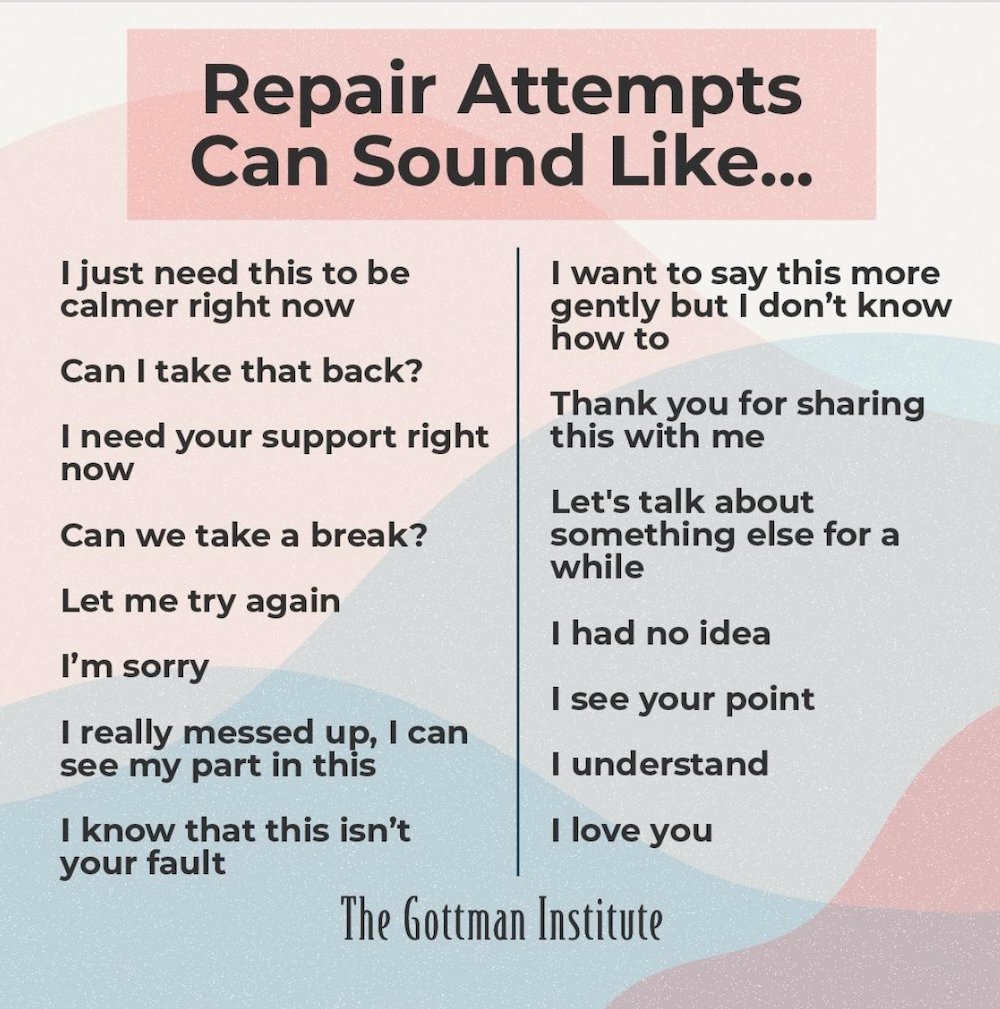This One Secret Weapon Can Wipe Out Negativity In Your Relationship
It takes practice. But it can change…everything.
by Carolyn Firestone
Apparently there is a “magic ratio” that determines whether couples will stay happy and together long-term. We’ve written all about it here, but the basic idea, which was developed by acclaimed relationship researcher John Gottman, is this:
For every one negative interaction a couple has, they need to have five positive, connected interactions.
Are you doing the math in your head? Tabulating the times you and your partner bickered? Complained? Iced each other in the past 24 hours?
Well shut it down. Because our point in telling you this is not to launch you into tailspin over the crappy interactions you get into with your partner. Instead, we want to offer an alternative.
A scientifically measured method for avoiding those very interactions and keeping your relationship in blissful, yet realistic balance.
It’s called a “repair attempt.”
Gottman defines a repair attempt as “any statement or action — silly or otherwise — that prevents negativity from escalating out of control.”
There are specific ways to go about making repair attempts, which we’ll get into, but the heart of it is that couples “are willing to admit responsibility for their part in conflict, and can then begin the processing of healing their bond.”
Here’s how to do it:
It starts, conveniently, with a checklist.
The Gottman Institute has created what’s essentially a worksheet of things you can say in that split second you feel yourself get triggered and that things are starting to escalate between you and your partner. They broke it down into 6 types of statements we can make to immediately curtail chaos.
Here’s how they go:
1. I feel…
Start by stating your own feelings rather than going on the attack. For example, “I’m feeling scared, sad, defensive, criticized, misunderstood, blamed, confused, worried, etc.”
2. Sorry
It takes real vulnerability to show up and say sorry, but hearing out the other person and owning whatever warped piece you’re bringing to the puzzle is the surest way to invite vulnerability from that other person.
Admit your reactions were off. Say out loud that you see your part in what went wrong. Ask about ways you could do better. Use the words, “I’m sorry.” Then start again in a gentler way.
3. Get To Yes
Look for ways to see eye to eye and validate your partner rather than undermine or negate every single thing they say. You don’t have to completely dismiss your own thoughts and feelings, but let them know you can also recognize their points and sides of things.
Try to find common ground and valid places to compromise. For example, you might say, “That part of what you’re saying makes total sense, and I hadn’t thought of it that way until now. I think there’s room to bring both our views into a solution.”
4. I Need To Calm Down
We’re not always going to be able to sail ourselves into that even-keeled headspace we so wish we lived in all the time. So, when things feel overwhelming or like we could be led down a dark path, just say so.
Gottman says it’s perfectly fine to admit, “I feel like I need to take a break/ calm down/ hear you say you love me/ feel supported/ be listened to/ get a hug.”
5. Stop Action!
And then, of course, there are those times when we need to halt the interaction altogether to have any chance of getting our dynamic back on track. Again, be direct in your statements, which might include things like, “Let’s stop/ change the subject for now/ start over/ take a break.”
6. I Appreciate
Show gratitude for your partner’s patience and willingness to collaborate and share. This is a thoughtful way of neither blaming your partner nor taking blame on yourself, but rather saying, “This is both of our problem. I value you showing up and both of us looking for a solution.”
You can vocalize what you’re thankful for or admiring of in your partner or simply say “I love you and want to understand you.”
One HUGE thing to keep in mind in making a repair attempt is that the goal isn’t to stir up and fix every problem you have as a couple. Because let’s face it, in these moments of tension, we’re rarely all at our calmest/ sanest/best. And even if we are, as two totally distinct and separate individuals, we’re not always going to see things the exact same way.
The goal of a repair attempt is simply to get back on track. To return to the positive ways of relating that actually serve us. Which we need to do to have any hope of making things better between us.
It’s not about avoiding our problems - just not giving every problem we have a battlefield to play out on…and ultimately, keeping our ratio and our relationships right where we want them to be.
carolyn firestone
Carolyn is the Managing Editor of The Candidly. Her favorite thing to do is to write about her favorite things, especially when they have even the slightest chance of making someone else’s something (mood, relationship, travel plans, or toiletry kit) a little better. You can find more of her articles here.
This article is for informational purposes only. It is not intended to be used in place of professional advice, medical treatment, or professional care in any way. This article is not intended to be and should not be a substitute for professional care, advice or treatment. Please consult with your physician or healthcare provider before changing any health regimen. This article is not intended to diagnose, treat, or prevent disease of any kind. Read our Terms & Conditions and Privacy Policy.








